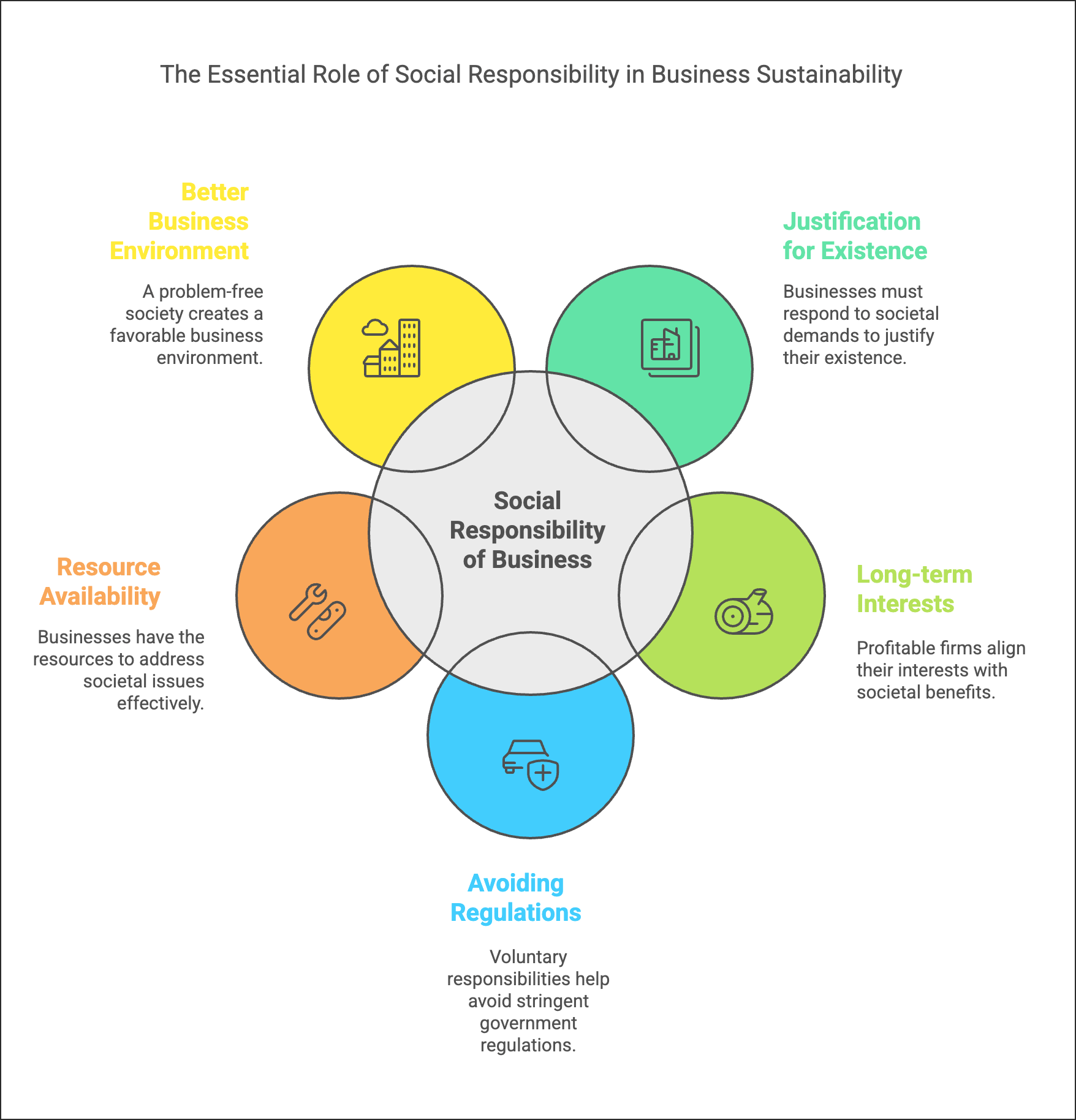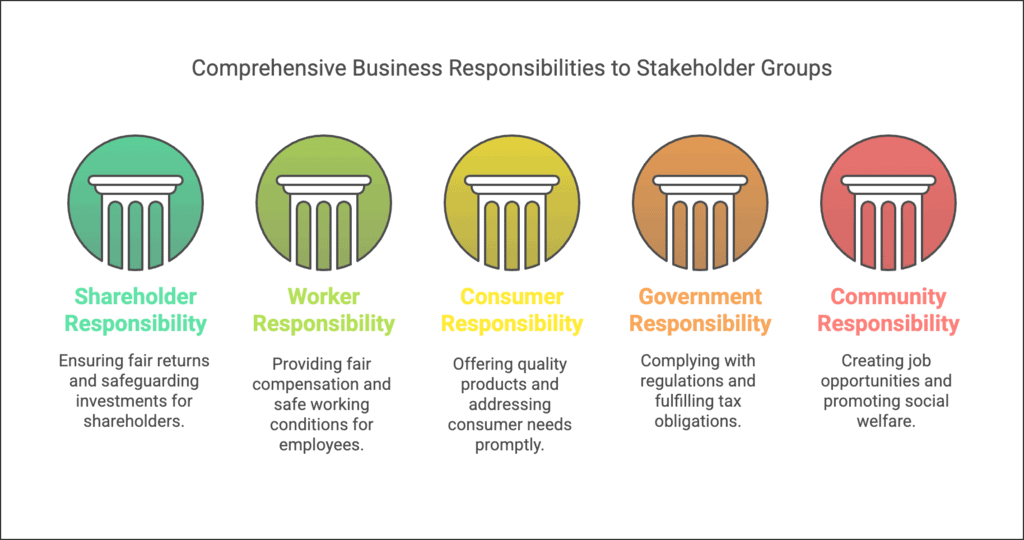Short Notes - Social Responsibilities of Business and Business Ethics | Business Studies (BST) Class 11 - Commerce PDF Download
CONCEPT OF SOCIAL RESPONSIBILITY
The social responsibility of business means its duty to make choices and take actions that are beneficial based on society's goals and values. A business should operate and earn profit in ways that meet society's needs. Therefore, social responsibility involves the voluntary actions of business people to help improve society. Since businesses use resources from society and earn money from their members, they must contribute back. Additionally, social responsibility includes the choice of business owners to take on these responsibilities or not.
Arguments in favour of Social Responsibility
There is a need for social responsibility of business for existence and growth.
(a) Justification for Existence and Growth:
- Business originates from society; hence, it should respond to society's demands.
- To survive and grow long-term, businesses must continuously serve society.
(b) Long-term Interest of the firm:
- A firm can maximise profits in the long run when society benefits.
- Unfair practices like adulteration or black marketing can threaten the firm’s existence.
(c) Avoidance of government regulations:
- By voluntarily taking on social responsibilities, businesses can reduce the need for new laws.
(d) Availability of resources with business:
- Businesses have financial and human resources that can effectively address societal issues.
(e) Better environment for doing business:
- A society with fewer problems offers a better environment for business operations.
- Improved quality of life and living standards benefit businesses.
(f) Contribution to social problems:
- Some social issues, like pollution and unsafe workplaces, are caused by businesses.
- It is morally right for businesses to engage in resolving these issues rather than leaving them to others.

Arguments Against Social Responsibility:
Major arguments against social responsibility are:
(a) Profit Motive:
- Businesses are driven by profit and should not waste resources on social responsibilities.
(b) Burden on consumers:
- Involvement in social responsibilities can lead to additional costs, ultimately passed on to customers.
- It may be seen as unfair to impose these costs on consumers.
(c) Lack of Social Skills:
- Business managers are skilled in operations, not in solving social issues like poverty.
- Social problems should be addressed by social experts.
(d) Lack of public support:
- The public often does not support business involvement in social issues.
- This lack of confidence makes it hard for businesses to meet social responsibilities.
SOCIAL RESPONSIBILITY TOWARDS DIFFERENT INTEREST GROUPS
Businesses interact with various interest groups, including shareholders, workers, consumers, the government, and the community. They hold responsibilities towards all these groups.
(a) Responsibility towards shareholders
- To ensure a fair and regular return on their investments.
- To safeguard their investments.
- To strengthen the company’s financial position.
- To protect business assets.
- To look after the interests of all types of investors.
(b) Responsibility towards workers
- To offer fair compensation and benefits.
- To ensure safe and good working conditions.
- To foster a sense of belonging among workers.
(c) Responsibility towards consumers
- To provide quality goods and services at reasonable prices.
- To ensure a regular supply of products.
- To keep consumers informed about new products and uses.
- To address customer complaints promptly.
(d) Responsibility towards government
- To pay taxes honestly.
- To follow government regulations.
- To avoid corrupting public officials.
(e) Responsibility towards the community
- To create job opportunities.
- To prevent environmental pollution.
- To uplift disadvantaged groups in society.

BUSINESS AND ENVIRONMENTAL PROTECTION
Meaning of Environment: The environment includes everything that surrounds us, both natural and man-made. This encompasses all land, water, and air, as well as cultural heritage, socio-economic institutions, and people. It is widely acknowledged that the quality of the environment is rapidly declining, especially due to industrial activities.
Meaning of Environmental Pollution: This refers to the release of harmful substances into the environment. Pollution adversely affects both human life and wildlife. A significant issue created by industries and businesses is pollution, primarily stemming from industrial production. Therefore, protecting the environment is essential.
Causes of Pollution: Numerous industrial organisations are responsible for air, water, land, and noise pollution.
(a) Air Pollution:
- Caused by smoke and chemicals released from factories and vehicles.
- This has led to a hole in the ozone layer, contributing to global warming.
(b) Water Pollution:
- Results from chemicals and waste dumped into rivers, streams, and lakes.
- This has caused the deaths of numerous animals and poses serious threats to human life.
(c) Land Pollution:
- Caused by the disposal of garbage and toxic waste that harms the soil.
- This contamination reduces soil fertility and makes it unsuitable for agriculture.
(d) Noise Pollution:
- Results from operations of factories and vehicles.
- This type of pollution can lead to various health issues, including hearing loss, aggressive behaviour, and mental disorders.
NEED FOR POLLUTION CONTROL
(a) To Ensure a Healthy Life:
- Pollutants are linked to many diseases, such as cancer, heart attacks, and lung problems.
- Controlling pollution is vital to mitigate these health risks.
(b) To Ensure Safety:
- Environmental pollution reduces visibility, increasing the likelihood of accidents.
- Monitoring pollution is essential to decrease accident rates.
(c) Economic Losses:
- Pollution negatively impacts both human health and wildlife.
- For example, the Taj Mahal is losing its beauty due to pollution, which illustrates the broader effects on health and the environment.
(d) Improved Public Image:
- A company that implements pollution control measures enhances its reputation as a socially responsible entity.
ROLE OF BUSINESS ENVIRONMENTAL PROTECTION
- Industrial organisations should adopt eco-friendly and low-waste technologies.
- The recycling of industrial waste should be maximised whenever possible.
- Modernising plants and machinery is crucial to reducing pollution.
- Businesses must comply with pollution prevention laws, such as the Wildlife Protection Act of 1972 and The Water (Prevention and Control of Pollution) Act of 1974.
- Proactive measures should be taken to safeguard the environment, including comprehensive environmental protection strategies and government initiatives.
BUSINESS ETHICS
Business Ethics refers to the moral values and standards that govern the actions of a businessman. Ethics clarify what is right and what is wrong. They encompass the business practices that are considered appropriate by society. The aim of business ethics is to guide managers and employees in their work. Examples include ensuring fair treatment of workers and paying taxes honestly to the government.
ELEMENTS OF BUSINESS ETHICS
(a) Top Management Commitment:
- CEOs and senior managers must be dedicated to ethical behaviour.
- This commitment sets a standard for all employees to follow.
(b) Publication of Code:
- A code of ethics is a formal document outlining the principles and standards guiding a firm's actions.
- It may include areas like honesty, quality, safety, and healthcare.
(c) Establishment of Compliance Mechanism:
- A suitable mechanism should be developed to adhere to the ethical standards of the business.
- This mechanism must be clearly communicated to everyone within the organisation.
Ethical Principles in Business
It is the employees at lower levels who put ethical principles into action, so their involvement in creating an ethical code is crucial.
Although measuring the outcomes of ethics programmes can be challenging, companies can conduct audits to ensure they are following ethical standards. The social responsibility of a business is defined as its duty to make decisions and take actions that are considered beneficial according to the goals and values of society. The basic elements of business ethics include:
- Top management's commitment.
- Establishment of compliance mechanisms.
- Involving employees at all levels.
Environmental Protection
What is environmental pollution? Why is business responsible for protecting the environment? Here are three responsibilities of businesses towards employees:
- Ensuring fair treatment.
- Providing a safe working environment.
- Supporting professional development.
Why should a business take on social responsibility? Major causes of environmental pollution include industrial waste, which can be both large in volume and hazardous. Business ethics is defined as the study of what is right and wrong in the business world, and it is significant for guiding behaviour.
There are arguments both for and against social responsibility, as various factors are increasing the demand for businesses to act responsibly. It is beneficial for businesses to meet their social responsibilities towards different stakeholders.
|
38 videos|180 docs|28 tests
|
FAQs on Short Notes - Social Responsibilities of Business and Business Ethics - Business Studies (BST) Class 11 - Commerce
| 1. What is social responsibility of business? |  |
| 2. How does social responsibility benefit businesses? |  |
| 3. What is business ethics? |  |
| 4. Why is business ethics important? |  |
| 5. What are some examples of unethical business practices? |  |






















